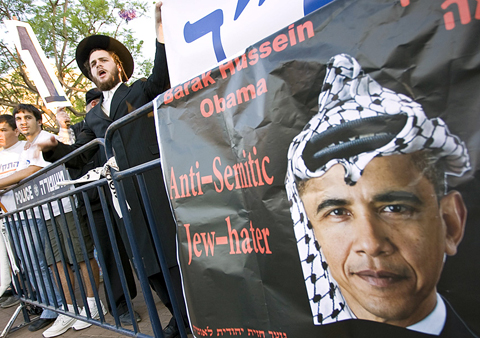Only one in five Israeli Jews believes a nuclear-armed Iran would try to destroy Israel and most see life continuing as normal should their arch-foe get the bomb, an opinion poll published on Sunday found.
The survey, commissioned by a Tel Aviv University think tank, appeared to challenge the argument of successive Israeli governments that Iran must be denied the means to make atomic weapons lest it threaten the existence of the Jewish state.
Asked how a nuclear-armed Iran would affect their lives, 80 percent of respondents said they expected no change.

PHOTO: AFP
Eleven percent said they would consider emigrating and 9 percent said they would consider relocating inside Israel.
Twenty-one percent of Israelis believe Iran “would attack Israel with nuclear weapons with the objective of destroying it,” the Institute for National Security Studies (INSS), which commissioned the poll, said in a statement.
Iran says its uranium enrichment, which has bomb-making potential, is for energy only.
But its leaders’ anti-Israel rhetoric and support for Islamist guerrillas in Lebanon and the Palestinian territories have stirred fears of a regional war.
Some Israeli officials have said that the Islamic republic’s ruling clerics may consider destroying Israel a goal worth the risk even of a devastating counter-strike: Israel is widely assumed to have the Middle East’s only atomic arsenal.
A longer-term scenario sees Iran using the nuclear spectre to undermine Israelis’ desire to stay in their homeland.
“The Israeli leadership may be more informed,” INSS research director Yehuda Ben Meir told Reuters, explaining that the discrepancy between public and government views about Iran.
But he said: “I think the Israeli public does not see this as an existential threat, and here there may be an exaggeration by some members of the leadership.”
“Most Israelis appear willing to place their bet on Israel’s deterrent capability and, I would add, on Iran’s rational behavior,” he said.
Netanyahu has hinted Israel could attack Iran pre-emptively should Western diplomacy fail to curb its uranium enrichment.
The INSS survey found 59 percent of Israeli Jews would support such strikes, while 41 percent would not back the military option.
The poll had 616 respondents and a margin of error of 3.5 percent, Ben Meir said.
Israeli Arabs, who make up some 20 percent of the population — and are generally less likely to see themselves as targets of the Jewish state’s enemies — were not included for budgetary reasons, he said.
A separate survey, commissioned by the Hebrew University of Jerusalem, found 52 percent support for pre-emptive Israeli attacks on Iran, with 35 percent of respondents opposed.

BLOODSHED: North Koreans take extreme measures to avoid being taken prisoner and sometimes execute their own forces, Ukrainian President Volodymyr Zelenskiy said Ukrainian President Volodymyr Zelenskiy on Saturday said that Russian and North Korean forces sustained heavy losses in fighting in Russia’s southern Kursk region. Ukrainian and Western assessments say that about 11,000 North Korean troops are deployed in the Kursk region, where Ukrainian forces occupy swathes of territory after staging a mass cross-border incursion in August last year. In his nightly video address, Zelenskiy quoted a report from Ukrainian Commander-in-Chief Oleksandr Syrskyi as saying that the battles had taken place near the village of Makhnovka, not far from the Ukrainian border. “In battles yesterday and today near just one village, Makhnovka,

The foreign ministers of Germany, France and Poland on Tuesday expressed concern about “the political crisis” in Georgia, two days after Mikheil Kavelashvili was formally inaugurated as president of the South Caucasus nation, cementing the ruling party’s grip in what the opposition calls a blow to the country’s EU aspirations and a victory for former imperial ruler Russia. “We strongly condemn last week’s violence against peaceful protesters, media and opposition leaders, and recall Georgian authorities’ responsibility to respect human rights and protect fundamental freedoms, including the freedom to assembly and media freedom,” the three ministers wrote in a joint statement. In reaction

BARRIER BLAME: An aviation expert questioned the location of a solid wall past the end of the runway, saying that it was ‘very bad luck for this particular airplane’ A team of US investigators, including representatives from Boeing, on Tuesday examined the site of a plane crash that killed 179 people in South Korea, while authorities were conducting safety inspections on all Boeing 737-800 aircraft operated by the country’s airlines. All but two of the 181 people aboard the Boeing 737-800 operated by South Korean budget airline Jeju Air died in Sunday’s crash. Video showed the aircraft, without its landing gear deployed, crash-landed on its belly and overshoot a runaway at Muan International Airport before it slammed into a barrier and burst into flames. The plane was seen having engine trouble.

REVELRY ON HOLD: Students marched in Belgrade amid New Year’s events, saying that ‘there is nothing to celebrate’ after the train station tragedy killed 15 Thousands of students marched in Belgrade and two other Serbian cities during a New Year’s Eve protest that went into yesterday, demanding accountability over the fatal collapse of a train station roof in November. The incident in the city of Novi Sad occurred on Nov. 1 at a newly renovated train facility, killing 14 people — aged six to 74 — at the scene, while a 15th person died in hospital weeks later. Public outrage over the tragedy has sparked nationwide protests, with many blaming the deaths on corruption and inadequate oversight of construction projects. In Belgrade, university students marched through the capital